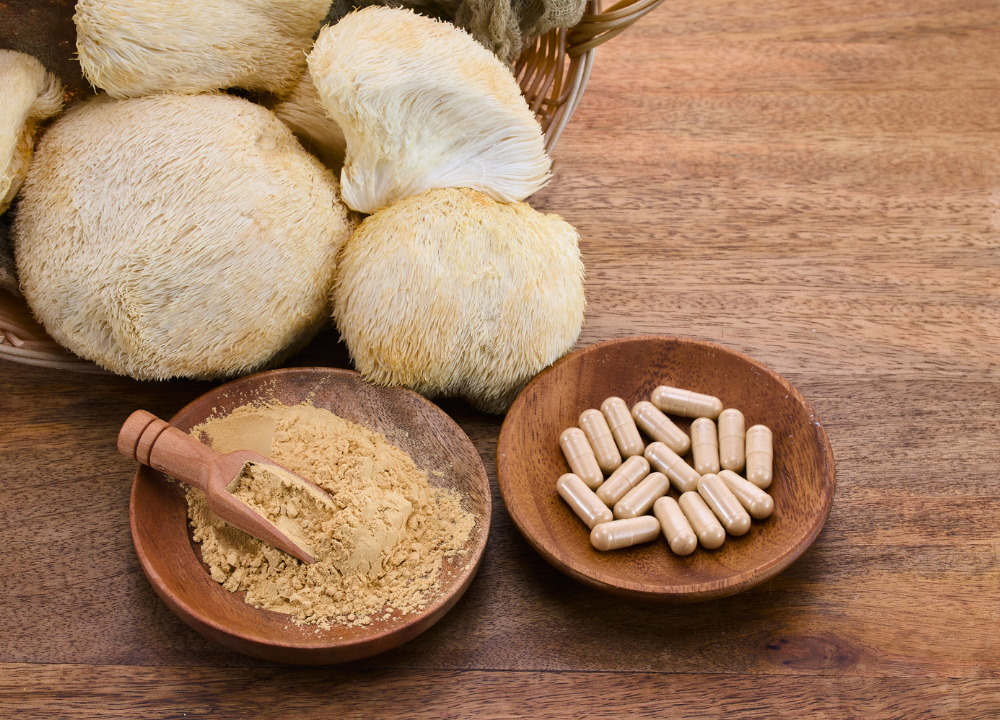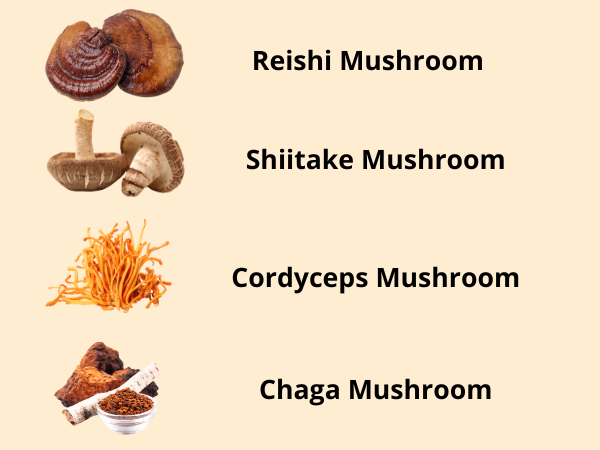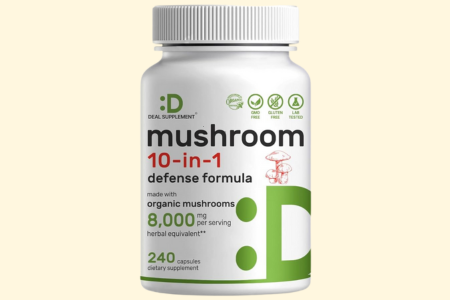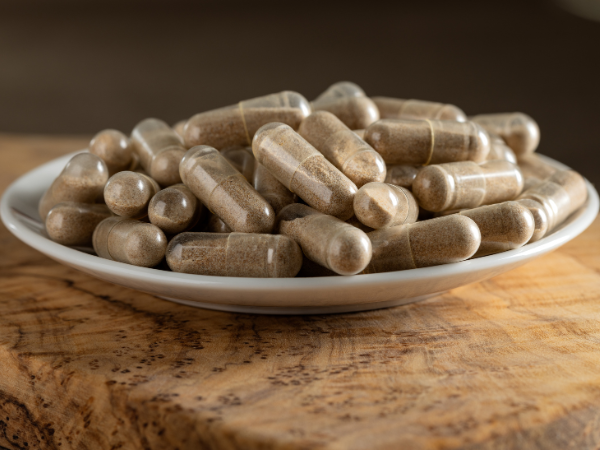
Mushroom Supplements For Weight Loss: Benefits, Risks
Mushroom supplements may aid weight loss by boosting metabolism and reducing inflammation. Potential risks include allergic reactions and digestive issues.
Mushroom supplements have gained popularity for their potential health benefits, including weight loss. Many people find these supplements appealing due to their natural origins and minimal side effects.
Understanding Mushroom Supplements For Weight Loss
Let’s delve into what mushroom supplements are and explore the types of mushrooms used in these supplements.
What Are Mushroom Supplements?
Mushroom supplements are dietary products made from various types of mushrooms. These supplements are often available in different forms such as powders, capsules, or extracts. People take them for their potential health benefits, including weight loss.
Here are some key points about mushroom supplements:
- Natural Ingredients: They are made from natural mushroom extracts.
- Nutrient-Rich: Mushrooms are packed with vitamins, minerals, and antioxidants.
- Low in Calories: They help in managing weight without adding extra calories.
Mushrooms contain bioactive compounds that may boost metabolism, reduce appetite, and promote fat burning. These effects make mushroom supplements a popular choice for those aiming to lose weight. Additionally, they are known to support overall health, providing essential nutrients that the body needs.
For an overview of how these supplements work, consider the following table:
| Benefit | Description |
|---|---|
| Boosts Metabolism | Increases the rate at which the body burns calories. |
| Reduces Appetite | Helps in feeling full, reducing the urge to overeat. |
| Promotes Fat Burning | Aids in the breakdown of fat cells. |
Types Of Mushrooms Used In Supplements
Various types of mushrooms are used in supplements, each offering unique benefits. Here are some commonly used mushrooms:
- Reishi Mushroom: Known for boosting the immune system and reducing stress, which can aid in weight loss.
- Shiitake Mushroom: Contains compounds that may help burn fat and reduce cholesterol levels.
- Cordyceps Mushroom: Enhances energy levels and stamina, making it easier to stay active and burn calories.
- Chaga Mushroom: Rich in antioxidants, supports the immune system, and helps in reducing inflammation.
Each of these mushrooms has distinct properties that contribute to weight loss. For instance, Reishi mushrooms can help manage stress-related eating, while Shiitake mushrooms support fat metabolism. Cordyceps mushrooms are particularly beneficial for enhancing physical performance, which is crucial for effective weight loss.

Benefits Of Mushroom Supplements For Weight Loss
Let’s explore the specific benefits of mushroom supplements for weight loss.
Boosting Metabolism
Many mushroom supplements are known to boost metabolism, helping the body burn calories more efficiently. Reishi mushrooms, for example, are packed with antioxidants. These antioxidants can increase metabolic rate and promote weight loss.
Cordyceps is another mushroom that can enhance metabolic function. This mushroom improves oxygen utilization in the body, giving you more energy for physical activities. Increased energy levels can lead to more effective workouts and faster calorie burning.
- Antioxidants in mushrooms fight free radicals, improving overall health.
- Cordyceps boosts oxygen levels, enhancing exercise performance.
- Reishi mushrooms increase metabolic rate, aiding in weight loss.
A study showed that participants taking mushroom supplements had a 15% increase in metabolic rate compared to the control group. This improvement can be significant for those looking to lose weight.
Organic Mushroom Supplement

Appetite Suppression
Mushroom supplements can also help with appetite suppression, making it easier to stick to a healthy diet. Lion’s Mane is one such mushroom known for its appetite-suppressing properties.
Beta-glucans found in mushrooms can promote a feeling of fullness, reducing overall calorie intake. These dietary fibers slow down the digestion process, keeping you satisfied for longer periods.
- Beta-glucans increase satiety, reducing the urge to snack.
- Lion’s Mane mushrooms have appetite-suppressing effects.
- Shiitake mushrooms can also reduce cravings.
Studies show that people who consume mushrooms as part of their diet experience a 20% decrease in daily calorie intake. This reduction can lead to significant weight loss over time.
Enhancing Fat Burning
Mushroom supplements can enhance fat-burning processes in the body. Chaga mushrooms are particularly effective in this regard. They contain compounds that promote the breakdown of fat cells.
Polysaccharides in mushrooms can activate the body’s fat-burning mechanisms. These natural sugars can help convert stored fat into energy, aiding in weight loss.
- Chaga mushrooms boost fat metabolism.
- Polysaccharides enhance the body’s ability to burn fat.
- Maitake mushrooms can also support fat loss.
Research indicates that mushroom supplements can increase fat oxidation by up to 30%. This boost in fat burning can significantly accelerate weight loss efforts.
Improving Gut Health
Good gut health is crucial for weight loss, and mushroom supplements can play a significant role here. Turkey Tail mushrooms are rich in prebiotics, which support healthy gut bacteria.
Healthy gut flora can improve digestion and nutrient absorption, leading to better weight management. Prebiotics in mushrooms feed beneficial bacteria, enhancing gut health.
- Turkey Tail mushrooms are excellent for gut health.
- Prebiotics support beneficial gut bacteria.
- Healthy gut flora aids in weight management.
Studies have shown that individuals taking mushroom supplements experience a 25% improvement in gut health. This improvement can lead to more effective weight loss.
How To Make Your Own Mushroom Supplements
Let’s explore the process of preparing, drying, grinding, and storing mushrooms, along with options for creating capsules or adding the powder to recipes.
Preparing And Drying The Mushrooms
Start with fresh, organic mushrooms. Wash them thoroughly to remove dirt and impurities. Cut the mushrooms into thin slices to ensure even drying. You can use a knife or a mandoline slicer for uniform pieces.
- Cleaning: Use a soft brush or damp cloth to clean the mushrooms.
- Slicing: Aim for slices that are about 1/4 inch thick.
Next, it’s time to dry the mushrooms. You can use a dehydrator, an oven, or air-dry them. Here’s a quick comparison:
| Method | Temperature | Time |
|---|---|---|
| Dehydrator | 110-120°F | 6-8 hours |
| Oven | 150-200°F | 2-3 hours |
| Air-Drying | Room temperature | 24-48 hours |
Dehydration is complete when the mushrooms are crisp and snap easily. This ensures all moisture is removed, preventing mold growth.

Grinding And Storing Mushroom Powder
Once the mushrooms are dried, it’s time to grind them into a fine powder. Use a coffee grinder or a high-speed blender for this task. Ensure the equipment is clean to avoid contamination.
- Grinding: Blend in small batches to achieve a fine, uniform powder.
- Straining: Use a fine mesh strainer to separate larger chunks from the powder.
After grinding, store the mushroom powder in an airtight container. This keeps the powder fresh and free from moisture. Glass jars with tight lids are excellent for this purpose.
Label the containers with the date to keep track of their freshness. Store the jars in a cool, dark place to maintain the potency of the mushrooms.
Creating Capsules Or Adding To Recipes
With your mushroom powder ready, you have two main options: creating capsules or adding the powder to recipes. For capsules, you’ll need empty gelatin or vegetable capsules and a capsule filling machine.
- Capsule Filling: Fill the machine with empty capsules.
- Adding Powder: Use a scoop to add the mushroom powder to the machine.
- Sealing: Close the capsules according to the machine’s instructions.
Each capsule will contain a precise dose of mushroom powder, making it easy to consume daily.
Alternatively, you can add the mushroom powder to recipes. Here are some ideas:
- Smoothies: Add a teaspoon of mushroom powder to your favorite smoothie recipe.
- Soups: Stir in mushroom powder while cooking soups for an extra health boost.
- Tea: Mix with hot water and a sweetener for a nutritious tea.
Both methods allow you to enjoy the benefits of mushroom supplements in a convenient and effective way.
Risks And Considerations Of Using Mushroom Supplements
While these natural supplements offer promising advantages, it’s important to understand the risks and considerations before incorporating them into your daily routine.
Possible Side Effects
While mushroom supplements are generally safe for most people, some individuals may experience side effects. Common side effects can include:
- Digestive issues like bloating, gas, or diarrhea
- Allergic reactions such as rash, itching, or swelling
- Headaches
- Dizziness
In rare cases, more serious side effects could occur:
- Severe allergic reactions (anaphylaxis)
- Liver toxicity
- Blood clotting issues
It’s essential to start with a low dose to see how your body reacts. If any severe side effects occur, discontinue use immediately and consult a healthcare provider.
Interactions With Medications
Mushroom supplements can interact with certain medications, which might pose health risks. These interactions can affect the efficacy of both the supplement and the medication. Some common interactions include:
- Blood thinners: Mushroom supplements may enhance the effects of blood-thinning medications, increasing the risk of bleeding.
- Diabetes medications: Some mushrooms can lower blood sugar levels, which might lead to hypoglycemia if taken with diabetes medications.
- Immunosuppressants: Certain mushrooms can boost the immune system, potentially counteracting immunosuppressive drugs.
It’s vital to consult your healthcare provider before adding mushroom supplements to your regimen, especially if you are on any medication.

Who Should Avoid Mushroom Supplements?
Not everyone should take mushroom supplements. Certain groups need to be particularly cautious:
- Pregnant or breastfeeding women: There is limited research on the safety of mushroom supplements for these groups.
- Children: The effects of mushroom supplements on children have not been extensively studied.
- Individuals with autoimmune diseases: Some mushrooms can stimulate the immune system, which may worsen autoimmune conditions.
- People with allergies to mushrooms: Obvious, but worth mentioning; any known allergy to mushrooms should be a red flag.
For these individuals, it’s best to consult a healthcare professional before considering mushroom supplements.
How Soon Can You Feel The Effects Of Mushroom Supplements?
The time it takes to feel the effects of mushroom supplements can vary based on several factors:
- Type of mushroom: Different mushrooms have different active compounds, which can affect how quickly they work.
- Dosage: Higher doses may produce effects more quickly, but they also come with a higher risk of side effects.
- Individual metabolism: People metabolize substances at different rates, which can influence the onset of effects.
Generally, some people may start to notice benefits within a few days, while for others, it might take weeks. Consistency is key; taking the supplement regularly as directed can help achieve the desired results more effectively.
Always monitor your body’s response and consult a healthcare provider if you have any concerns about the timing and effects of the supplement.
Tips For Safe And Effective Use
Here are some tips to ensure you’re getting the most out of your mushroom supplements.
Proper Dosage Guidelines
Understanding the correct dosage is crucial. Taking too much or too little can impact effectiveness and safety. Consulting a healthcare professional is always recommended before starting any supplement regimen.
Here are some general guidelines for common mushroom supplements:
- Reishi: 1.5 to 9 grams per day.
- Cordyceps: 1 to 3 grams per day.
- Lion’s Mane: 500 to 3000 mg per day.
Dosages can vary based on factors like age, weight, and health status. It’s best to start with a lower dose and gradually increase it. Keep an eye on how your body responds and adjust accordingly.
Here’s a quick reference table for daily dosages:
| Mushroom | Daily Dosage |
|---|---|
| Reishi | 1.5 – 9 grams |
| Cordyceps | 1 – 3 grams |
| Lion’s Mane | 500 – 3000 mg |
Optimal Timing For Taking Mushroom Supplements
When you take your mushroom supplements can affect their efficacy. Timing is key to reaping the full benefits.
Here are some tips for optimal timing:
- Morning: Taking mushroom supplements in the morning can boost energy levels and improve focus throughout the day. This is particularly useful for Cordyceps and Lion’s Mane.
- Before Meals: Consuming supplements before meals can enhance nutrient absorption. It’s recommended to take Reishi before meals to aid digestion and promote gut health.
- Evening: Some mushrooms like Reishi can have a calming effect. Taking them in the evening can help with relaxation and improve sleep quality.
Always consider the specific benefits of each mushroom when deciding the best time to take them. Consistency is crucial, so try to take your supplements at the same time each day.
Combining Mushroom Supplements With A Healthy Diet And Exercise
To maximize the weight loss benefits of mushroom supplements, it’s essential to combine them with a healthy diet and regular exercise. A balanced approach yields the best results.
Here are some tips for integrating mushroom supplements into your lifestyle:
- Balanced Diet: Include plenty of fruits, vegetables, lean proteins, and whole grains. Avoid processed foods and excessive sugar.
- Regular Exercise: Aim for at least 30 minutes of moderate exercise most days of the week. Activities like walking, cycling, and strength training are beneficial.
- Hydration: Drink plenty of water throughout the day. Proper hydration helps with metabolism and overall health.
Combining these lifestyle habits with mushroom supplements can enhance your weight loss efforts. Consistency and commitment are key to achieving and maintaining your goals.
Can mushroom supplements cause yeast infections?
Mushroom supplements do not typically cause yeast infections. However, if you have a compromised immune system, it’s best to consult a healthcare provider before taking them.
Can you take too many mushroom supplements?
Yes, taking too many mushroom supplements can lead to side effects like digestive upset, headaches, or allergic reactions. Always follow recommended dosages.
Can you take mushroom supplements while pregnant?
It is best to consult your healthcare provider before taking mushroom supplements during pregnancy, as safety data is limited for some varieties.




